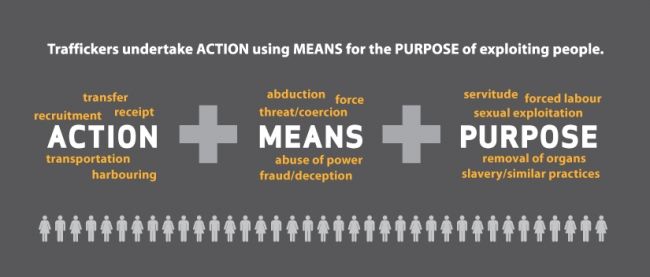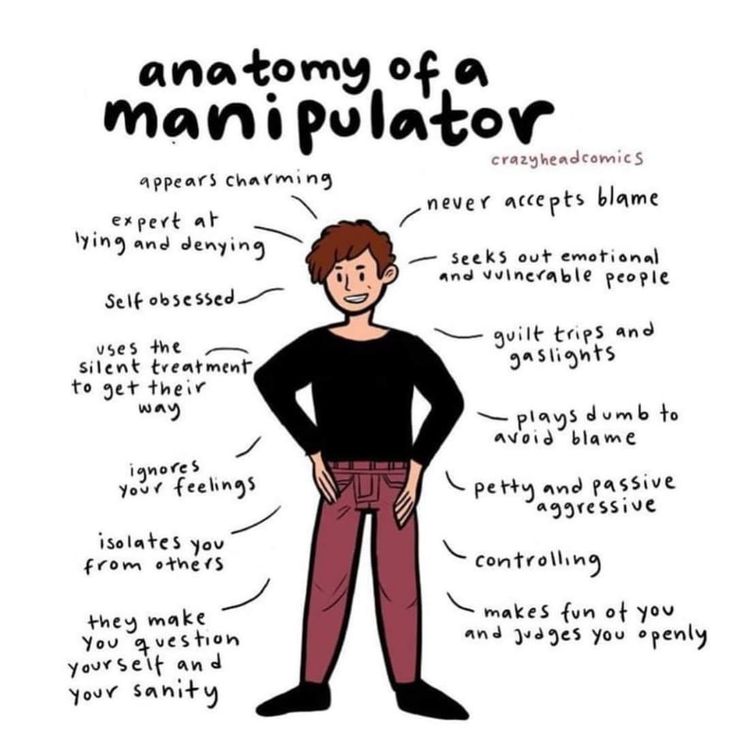Why do people cheat on their spouses
Why Do People in Relationships Cheat?
Cheating: it’s the ultimate relationship violation and a notorious relationship killer. A favorite gossiping pastime, the phenomenon is frequently discussed but difficult to study. The goal is to avoid getting caught, so why confess infidelity in the name of science?
But scientists can offer us new insight on a topic often shrouded in stigma and mystery. As researchers have recently demonstrated, cheating is rarely a simple affair. There are many reasons why people cheat, and the patterns are more complex than common stereotypes suggest. A fascinating new study sheds some light on these motivations.
The investigation included 495 people (87.9 percent of whom identified as heterosexual), who were recruited through a participant pool at a large U.S. university and through Reddit message boards with relationship themes. The participants admitted to cheating in their relationship and answered the question at the root of the mystery: Why did you do it? An analysis revealed eight key reasons: anger, self-esteem, lack of love, low commitment, need for variety, neglect, sexual desire, and situation or circumstance.
These motivations not only influenced why people cheated but how long they did so, their sexual enjoyment, their emotional investment in the affair and whether their primary relationship ended as a result.
Though most cheating involves sex, it is rarely just about sex itself. Most participants felt some form of emotional attachment to their affair partner, but it was significantly more common in those who reported suffering from neglect or lack of love in their primary relationship. Around two thirds of participants (62.8 percent) admitted to expressing affection toward their new partner. And about the same proportion (61.2 percent) engaged in sexually explicit dialogue with them. Roughly four out of 10 (37.6 percent) had intimate conversations, while one in 10 (11.1 percent) said, “I love you.” Those who reported feeling less connected to their primary partner experienced greater emotional intimacy in the affair, perhaps as a way of fulfilling that need. Similarly, when infidelity was linked to lack of love, individuals found the experience more intellectually and emotionally satisfying.
Participants’ satisfaction with sex differed depending on the reason for their affair. People reported feeling more sexually fulfilled when they cheated because of desire, lack of love or a need for variety. Those who cited a situation as the primary cause were far less satisfied. Much of the sexual activity was limited to kissing (86.7 percent) and cuddling (72.9 percent). In fact, the study found that only half of the cheaters reported having vaginal intercourse.
The reason for the infidelity also greatly impacted its length. In some cases, the relationship was a brief tryst, while others were a longer and deeper attachment. Those who cheated because of anger (such as a wish to “seek revenge”), lack of love or need for variety had a longer affair, while those motivated by the situation (such as those who were “drunk” or “overwhelmed” and “not thinking clearly”) ended it earlier. Women also had a longer affair on average than men.
In the end, only a third of participants ultimately admitted the cheating to their primary partner. Women were more inclined to fess up than men. Those who came clean were more likely to have cheated out of anger or neglect rather than sexual desire or variety. This suggests that their confession was possibly a form of retribution and a way to exact revenge instead of a way to clear their conscience. The participants who confessed were also more likely to form a committed relationship with the affair partner.
Women were more inclined to fess up than men. Those who came clean were more likely to have cheated out of anger or neglect rather than sexual desire or variety. This suggests that their confession was possibly a form of retribution and a way to exact revenge instead of a way to clear their conscience. The participants who confessed were also more likely to form a committed relationship with the affair partner.
While infidelity is typically a clandestine enterprise, some cheaters were less careful than others, perhaps intentionally. Those cheating because of lack of love went on more public dates and displayed more public affection toward their partner. PDA was also common for those seeking variety or looking to boost their self-esteem. On the other hand, situational cheaters were less inclined to cheat out in the open, perhaps because they hoped to return to their primary relationship without getting caught.
So is an affair really a relationship killer? Ultimately, the fate of the participants’ primary relationship depended less on the act itself and more on what motivated it. Cheating was more likely to end a relationship when it arose from anger, lack of love, low commitment or neglect. And it was less likely to do so when the infidelity was circumstantial. Surprisingly, only one in five (20.4 percent) of relationships ended because of the affair. The same number of couples (21.8 percent) stayed together despite their primary partner finding out, while slightly more (28.3 percent) stayed together without their partner discovering their infidelity. The remaining relationships broke up for noncheating reasons.
Cheating was more likely to end a relationship when it arose from anger, lack of love, low commitment or neglect. And it was less likely to do so when the infidelity was circumstantial. Surprisingly, only one in five (20.4 percent) of relationships ended because of the affair. The same number of couples (21.8 percent) stayed together despite their primary partner finding out, while slightly more (28.3 percent) stayed together without their partner discovering their infidelity. The remaining relationships broke up for noncheating reasons.
Rarely did infidelity lead to a real relationship. Only one out of 10 of the affairs (11.1 percent) ultimately turned into a full-fledged commitment—one of the preconceptions that turns out to be true.
ABOUT THE AUTHOR(S)
Gary W. Lewandowski, Jr., is a professor of psychology at Monmouth University. He is author of the new book Stronger Than You Think: The 10 Blind Spots That Undermine Your Relationship ... and How to See Past Them.
and How to See Past Them.
Why Do People Cheat? 8 Reasons for Infidelity, Explained by Experts
When my former boyfriend discovered that I had cheated on him, I felt physically sick with guilt, despair, and grief. But I also had plenty of excuses as to why I did it.
After I moved thousands of miles away for a job, we struggled to adjust to a long-distance relationship. I felt neglected, lonely, and unable to communicate what I needed via Skype. When I met someone new and exciting, I told myself we were just friends. And then we weren’t.
During our first visit in nearly a year, I forgot to log out of my Facebook on my partner’s laptop. He read my messages, and the life we’d built together exploded. Of course, it was all my fault—I’d planted the bomb and somehow hoped he’d never find it. Many painful, hours-long conversations followed, as did an attempt at an open relationship. But we couldn’t recover.
A few years later, I got a taste of my own medicine when a new partner cheated on me. I completely lost it, and despite my need to ask how he could hurt me like that over and over again, none of his explanations mattered. In my mind, he was bad, cheating was bad, and it was that simple. Pretty hypocritical, right? Unfortunately, I’m not alone.
I completely lost it, and despite my need to ask how he could hurt me like that over and over again, none of his explanations mattered. In my mind, he was bad, cheating was bad, and it was that simple. Pretty hypocritical, right? Unfortunately, I’m not alone.
Cheating can destroy a marriage, shatter your ability to trust future partners, hurt your kids, and even lead to depression, anxiety, and post-traumatic stress disorder (PTSD). The vast majority of adults agree that it’s wrong, but anywhere from 39 to 52% of us may experience infidelity at some point in our lives.
Why do people cheat?
“There’s a multitude of reasons why people cheat,” says Kenneth Paul Rosenberg, M.D., a psychiatrist and author of Infidelity: Why Men and Women Cheat. According to a 2017 article published in the Journal of Sex Research, explanations for infidelity often dip into three main categories: personal problems, beliefs, or characteristics; issues with your partner or the relationship as a whole; and situational factors like easy access to dating websites, long business trips, or liquid courage.
To further complicate things, sometimes what “counts” as cheating to you may be radically different from what your partner sees as okay versus definitely not okay. Research shows our definitions of infidelity can range vastly from having a celebrity crush or watching porn on the conservative side to only in-person sex acts on the more liberal side.
Although sexual relationships are often considered the worst of betrayals, Dr. Rosenberg says it’s important not to underrate emotional affairs, which can be just as devastating.
If you’re here, you’re probably trying to understand why you, your partner, or someone you care about cheated. There may be no single reason why, and it’s often difficult to get a satisfying answer out of someone who has mastered the habit of lying to you or feels deeply ashamed and confused.
But to give you some insight, we asked real people to explain why they cheated—and asked relationship experts to weigh in on the reasoning, plus how you can begin to sort out what comes next after infidelity.
I cheated because I was really dissatisfied with our relationship and didn’t feel seen or understood by my partner. I confessed immediately afterwards, and today, my ex remains one of my oldest friends. Looking back, I wish I’d had the emotional intelligence at the time to tell him how I felt or break up with him. —Taylor C., 23*
One common reason for cheating is that the partnership isn’t satisfying, says Ashley E. Thompson, Ph.D., an associate psychology professor who researches infidelity at the University of Minnesota in Duluth. If you’ve grown distant, don’t have anything to talk about, or can’t remember the last time you had sex, you or your partner may end up looking for connections outside of the relationship rather than trying to fix problems at home.
2. They didn’t think through the consequences.
I cheated out of stupidity. I was just on autopilot. I was hanging out with someone, they seemed receptive, and I went for it. I wasn’t really letting the potential consequences of my actions rise to consciousness. I was simply doing what felt good in the moment. Many years later, I feel like I’ve grown out of it. Falling in love with the right person certainly helped. —Jackson P., 45*
The saying, “Once a cheater, always a cheater,” by no means applies to infidels across the board, but it might have a grain of truth, says Thompson. “There are certain personality characteristics that are indicative of folks who commit infidelity,” she says. In particular, people who are not so self-disciplined may be more apt to say they were “swept away by the moment” due to factors like mood lighting at the bar or too much to drink when, in fact, their own impulsiveness and penchant for risk-taking could be to blame.
3.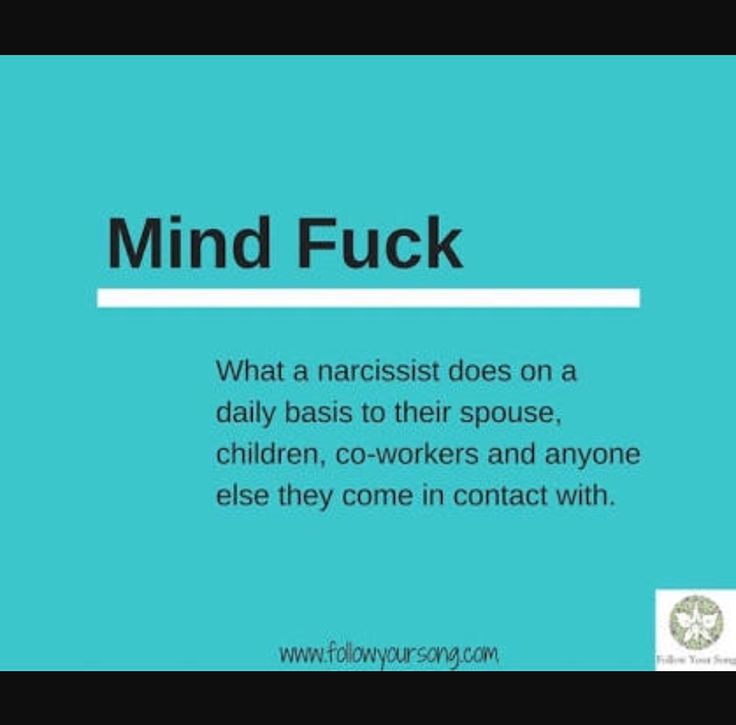 They got a rush out of it.
They got a rush out of it.I cheated on my first wife because I got off on the intrigue—the planning, excitement, my so-called brilliance at not getting caught. My second wife is a real partner in every sense of the word, and I haven’t thought about straying in 15 years. When you cheat on someone, whether you get away with it or not, you create a wound in your partnership that doesn’t entirely heal. Enough of those wounds or a big enough one, and you kill your relationship. That’s what keeps me honest today—the sense that you can “win” and still wind up the loser. —Ian G., 45
“A fair number of people cheat just because they can,” says Dr. Rosenberg. Contrary to the stories you often hear about discontent spouses, a partner who cheats might be relatively happy with their primary relationship but their partner isn’t open to a non-monogamous arrangement, they want the best of both worlds, or they get a thrill from secretly pursuing new hookups.
On a biological level, people who are more prone to infidelity may be driven by an upsurge in pleasure chemicals like dopamine, vasopressin, and oxytocin. Those who are more extroverted may be more likely to cheat because they thrive on new social connections.
I cheated because I wanted validation. I was very insecure and had to be the center of my partner’s attention all the time. I didn’t feel happy or worthy if I wasn’t constantly being fawned over by him. The night it happened, I was at a party, someone else started flirting with me, and it went downhill from there. Since then, I’ve vowed to never hurt someone like that again and I’ve learned not to look for an external source to solve an internal problem. I still struggle with low self-esteem, but that’s my problem, not my partner’s, and I know that cheating won’t “fix” it in any way.—Alyssa G., 29
Often, there are conscious reasons for cheating (like: “You don’t give me enough attention!”) as well as more unconscious reasons (such as problems dealing with difficult emotions or trauma), says Gilza Fort Martínez, a Miami-based licensed family and marriage therapist specializing in life transitions and conflict resolution. Over half of people who cheat say self-esteem has something to do with it.
If a partner isn’t feeling good about themselves and isn’t addressing that in a healthy, productive way, such as therapy, they’re more likely to end up in a relationship wracked with negativity and fighting. As a result, they might seek out someone else to boost their shaky ego or establish a sense of control over their lives—even if it’s ultimately self-destructive.
I knew cheating wasn’t right, but I couldn’t find the willpower to stop myself.While I think I’d be capable of monogamy now, I choose to be polyamorous because it allows for more boundary-setting, communication, and the ability to talk about desires and sex without worrying about jealousy. This way, I can keep myself relatively independent while still enjoying people’s company. —Ami M., 23
It’s normal to find other people attractive, have sexual fantasies, or want multiple sexual and/or romantic partners in your life. But when you act on those desires without your partner’s knowledge and enthusiastic consent, you get into tricky territory.
Some people tend to be more open to sex outside of their primary relationship and could end up cheating if they don’t communicate their needs to their partner. A better alternative? Just be honest with yourself and your partner about what you want, says Dr. Rosenberg. These days, you do have options like ethical non-monogamy, polyamory, or an open relationship.
In college, I was dating this terrible guy and planned to break up with him. However, I decided to be spiteful and ended up sleeping with a friend of mine who I ran into randomly while running errands. When we reconnected, I began to think about all the horrible things my boyfriend had said to me, the put-downs, lack of appreciation, drama. I just didn’t care anymore. I know it was immature, wanting revenge like that. I’m not proud of it. But I also don’t feel like it was that big of a deal compared to what he put me through. —Vanessa R., 38
If you’ve ever been betrayed by a partner, you know that fury often comes along with anguish and confusion. The desire for revenge is another common motive for infidelity, says Thompson. While many cheaters will do everything they can to avoid getting caught, others might want their partner to find out in order to “get back at them” for having an affair or treating them poorly. Case in point: Nearly half of people who cheat say anger factored into their reasoning, according to one study.
Case in point: Nearly half of people who cheat say anger factored into their reasoning, according to one study.
I was in a bad marriage with an abusive man, and one of the few things he allowed me to do was go to karaoke with friends. One night, I met a guy who was funny and so unlike my husband. Hanging out with him—and eventually cheating with him—gave me confidence and made me realize how I actually deserved to be treated. I know there’s no excuse for infidelity, but to me, the real story is I found someone who really cares about me and gave me the guts to get a divorce. Over four years later, we’re still together. —Liz K., 29
While there’s little research on this, some study participants’ stories suggest infidelity could actually serve as “an adaptive mechanism by which to escape” for someone in a toxic or abusive relationship, says Thompson.
If you’re unable to end a bad relationship or want to but can’t quite take that step yet, having an affair with someone else who treats you well could serve as a reminder that you’re entitled to a healthy, happy, and fulfilling relationship—and give you the courage to get out, confirms Tammy Nelson, Ph.D., a sexologist, licensed relationship therapist, and author of When You’re the One Who Cheats.
If you’ve been walking on eggshells or feel unsafe with your partner, you can figure out next steps with the help of a therapist or a resource like the National Domestic Violence Hotline (NDVH) at 1-800-799-SAFE (7233) or TTY 1-800-787-3224.
Many years ago, I was married to someone I got along with great, but our sex life was never passionate. I had this friend who I’d always genuinely enjoyed being around, and felt this sexual tension with.One night, we finally opened up about how we felt and had this incredibly passionate kiss. I felt like I’d finally woken up after years of just going through the motions. I was ashamed that I’d let my life go so far and felt guilty for wasting my wife’s time, too. I told her everything and we got divorced. Today, I’ve been married to this new person for over 20 years, and my ex is happily single. Cheating is wrong and it destroys people and marriages, but living a life without passion is just as wrong and also destroys people. —Chris B., 47
Of all the reasons for cheating, the most painful and common one is simply a lack of love. At the beginning of a relationship, just grazing your partner’s hand can get your heart thumping, let alone seeing their clothes come off. “But that kind of romantic love lasts a couple of years—if you’re lucky,” says Dr. Rosenberg. Because we’re “passion-bound creatures,” fidelity isn’t always easy when that initial spark fades, he says.
“Just because you’re married doesn’t mean you’re immune to falling in love with another person,” adds Nelson. Sometimes, as heartbreaking as it can be, relationships have expiration dates. While it’s best to end a partnership with integrity before moving on, when someone begins to feel the heat with another person, they may cheat before they can admit that their initial partnership has truly fizzled out.
Whether you cheated or your partner betrayed you, the first step is to find a trusted loved one, mentor, or therapist to talk it out with individually, says Dr. Rosenberg.
The next stage is to ask yourself some hard questions: Are you staying or are you going? What are the pros and cons of each option in terms of the effect on your family, financial entanglements, the history you share? What was your relationship like before the betrayal and how might you rebuild trust? Both partners have to answer these questions on their own, says Fort-Martínez.
“Cheating is a painful, often very devastating situation, but it could also be a gift.”
After that, if you choose to stay together, a couples’ therapist can help you navigate the grieving process, work on your communication skills, regain intimacy, and move forward. To make it work, Fort-Martínez says she looks out for three key things in the person who cheated: the willingness to be open and transparent, the ability to take emotional hits from a distraught partner, and expressions of true remorse.
If you decide to break up or get a divorce, know that there’s no foolproof way to prevent infidelity in the future, but you can do your best to lower your risk. To avoid misunderstandings, all of the experts we spoke with recommend that you have an honest conversation about what exclusivity means to you and make compromises on boundaries and expectations so you’re on the same page from the very beginning.
“Cheating is a painful, often very devastating situation, but it could also be a gift,” says Fort-Martínez. You may finally realize your relationship has been broken for a long time, you’re free at last, or you haven’t been valuing your connection—and it’s time to pay more attention to yourself or your partner.
*Name has been changed
Lauren Krouse
Lauren Krouse is a freelance writer who covers health, domestic violence, and self-advocacy. Her work appears in _Women’s Health, Men’s Health, Prevention, Self, HuffPost, and elsewhere. When she’s not writing, you can find her trying to meditate more, weightlifting, or walking in the woods with her partner and black lab.
The Science of Passion: Why Cheating Even in a Happy Marriage
Health
© Pakmor/Shutterstock
Author Maria Smirnova
November 20, 2017
Pink talks about what pushes us to cheat, and, together with the practicing psychotherapist Alla Solomatina, she understands in what situations it is possible to avoid relationships on the side.
The decision-making mechanism to change is very complicated. It involves not only our brains and hormones, but also the attitudes of society, the patterns and problems that we bring into our marriage, including from our parental family.
- From a neuroscientific point of view, the neurotransmitter dopamine plays a significant role in maintaining any romantic relationship. He participates in the system of encouragement and the formation of addictions - including drugs and, in part, love. We want our partner to behave in a certain, pleasant way, because the brain in this case perceives his actions as a reward. But as soon as his actions cease to satisfy us, the magical effect of dopamine weakens, there is a need to find another source of pleasure. Dopamine, in fact, keeps the first passion. When it calms down and the relationship goes back to normal, you have to make an effort to maintain them. Not everyone is ready for this.
- Oxytocin, also known as the attachment hormone, also plays an important role.
 For a long time, it was associated only with the relationship between mother and child, but then it turned out that it is also produced during close contact between lovers. For oxytocin to make your marriage stronger, you need to hold hands, hug, kiss, and yes, have sex. The lack of physical intimacy in a couple leads to infidelity, not only because the man or woman is deprived of the opportunity to have sex, but also because when you do not touch and snuggle up to each other, the oxytocin threads that bind you weaken.
For a long time, it was associated only with the relationship between mother and child, but then it turned out that it is also produced during close contact between lovers. For oxytocin to make your marriage stronger, you need to hold hands, hug, kiss, and yes, have sex. The lack of physical intimacy in a couple leads to infidelity, not only because the man or woman is deprived of the opportunity to have sex, but also because when you do not touch and snuggle up to each other, the oxytocin threads that bind you weaken.
Advertising on RBC www.adv.rbc.ru
- Psychotherapist Esther Perel says that cheating often has nothing to do with our partner at all. It becomes part of the search for oneself - including through the acceptance of one's sexuality and working through childhood traumas. A woman can be very happily married to an intelligent university teacher. But if in her youth her mother forbade her to meet with a dangerous biker, as an adult, she can find herself a lover like him in order to close the gestalt and understand why then, many years ago, she needed just such a man.

- In 2013, a British-American group of scientists published the results of a study in which it turned out that people cheat also because they get pleasure not even from sex or flirting with another person, but from violating moral norms. Many of us like to feel “wrong,” and cheating is just one way to show others our strength and audacity.
- Historians also deal with the problems of adultery. Until about the 19th century, monogamous marriage was a social and highly pragmatic act. It was easier to manage a large family than alone, and the transfer of genes was considered almost sacred. Now the role of marriage has changed: every year we become more and more economically independent, and in a partner we are looking for a person who will become our friend, lover, travel companion - anyone. As a result, we change because we simply have the opportunity to look for a suitable couple, even for the rest of our lives.
Does this mean that we are doomed to change? Yes and no. On the one hand, in marriage there may indeed be a desire to change. On the other hand, if you understand yourself and your relationship with your partner, the risk of infidelity or the need for it become lower.
On the one hand, in marriage there may indeed be a desire to change. On the other hand, if you understand yourself and your relationship with your partner, the risk of infidelity or the need for it become lower.
Situation. Many people expect that the romance, passion, and surprises that started a relationship will continue into marriage. When that doesn't happen, they look for thrills on the side.
How to avoid infidelity. “I would try to find out what the spouses feel in their real, live relationship at this stage,” says Alla Solomatina, a practicing psychotherapist, candidate of psychological sciences. - What exactly are they nostalgic for, looking back at the “candy-bouquet” period? It may very well be that behind the idealization of a beautiful beginning there is a fear of the routine of family life. The belief that there is no place for beauty, love, romance in it at all. Often, following their tired mothers, grandmothers heroically surviving alone, dull or drinking fathers, people carry a deep, destructive program: a family is a duty, it is work. And life with pleasure, joyful idleness, the sexuality of spouses shown is a sin and shame. Recognizing these inner inhibitions releases both passion and romance and the joy of endless recognition of each other.
And life with pleasure, joyful idleness, the sexuality of spouses shown is a sin and shame. Recognizing these inner inhibitions releases both passion and romance and the joy of endless recognition of each other.
Situation. A child has appeared in the family, and the woman devotes all her time to him. As a result, a man cheats to get the attention that he lacks in the family.
How to avoid adultery. “Behind this scenario, I see a distortion of the family system: the husband falls into an infantile state and a competing relationship with the baby for the mother's love, and the wife heroically assumes the role of an ideal, omnipotent Mother. Here it is very important for a woman to convey her real feelings to her husband: a sense of endless responsibility for the life of the baby, and fatigue, and a desire for support and comfort, and the need to trust a man. And to the husband - to share that he feels relegated to the background, that he misses caresses and tenderness, that sometimes he feels awkward and awkward with the baby. This is an extremely difficult, but very resourceful period in the life of a family, and by going through it sincerely and together, spouses can reach a very deep level of intimacy.
This is an extremely difficult, but very resourceful period in the life of a family, and by going through it sincerely and together, spouses can reach a very deep level of intimacy.
© Pakmor/Shutterstock
Situation. One partner cheats because he wants to take revenge on the other for past grievances: for indifference, for rudeness, or for the betrayal that he once committed.
How to avoid adultery. “Of course, it is necessary to speak! Try to be heard and try to hear the other. Speak in the first person, not accusing ("You are like that, you are like that!"), but by appealing to yourself: "I feel pain. I feel that I can't cope" and so on. If a tangle of grievances has accumulated, then it is better to resort to the help of an intermediary - a psychotherapist. Treason out of a sense of revenge is a war in which there will be no winners, including among those who are drawn into this game.
Situation. Treason is brought as a pattern from the parental family.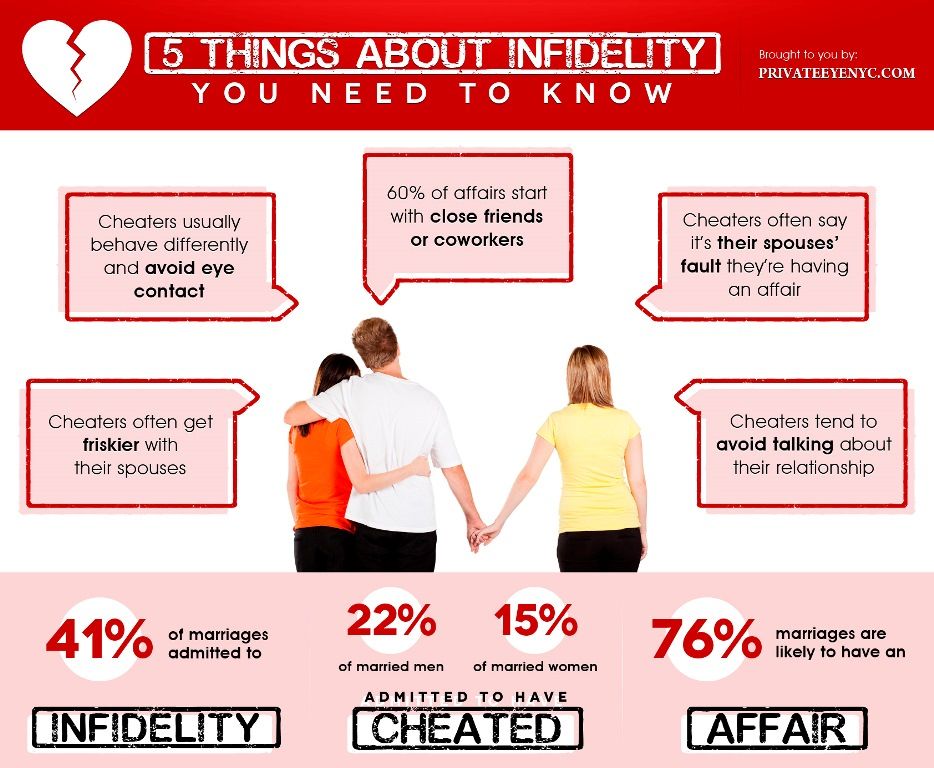 The father took a mistress, for example, and the mother put up with it, and now the man believes that everything in his marriage should be arranged in a similar way. Or a woman cheats on her husband because he does not fit the definition of an ideal man that her mother imposed on her, and, realizing that it will not work to change him, she finds a lover.
The father took a mistress, for example, and the mother put up with it, and now the man believes that everything in his marriage should be arranged in a similar way. Or a woman cheats on her husband because he does not fit the definition of an ideal man that her mother imposed on her, and, realizing that it will not work to change him, she finds a lover.
How to avoid adultery. “We all bring some scenarios from the family history of our parents and grandparents into partnerships. Including scenarios of changes. The challenge facing anyone who enters into a close relationship is to learn to live with their head. And with your heart. Those patterns that are “built into us” lose their power as soon as we ask ourselves the question: “Do I really think so? Do I really want this or is it accepted? Is this my (our) decision or greetings from the past?” Our grandparents were helped to survive by completely different life priorities. But if now they are not adequate to our culture, our "I", our real relationships, our living feelings, they need to be recognized and said goodbye to them, like old clothes.
According to Alla Solomatina, in order to understand the true causes of infidelity, it is important to realize at least two aspects of partner relationships: firstly, what each person in a couple actually feels (both in specific situations and in general), and secondly how partners deal with these feelings.
“Often even loving spouses don't notice each other's real feelings,” says Alla. - For example, in psychotherapeutic work with a married couple who have lived in love for many years, it suddenly turns out that behind the joint image “we are cool hikers”, the wife has long accumulated fatigue and irritation at the discomfort of such a vacation. But she cannot even admit this to herself, because for her and her husband it would mean "getting old in spirit." The psychotherapist has to "amplify" the voice of one of the partners, which in ordinary life sounds quieter.
An example could be given of a more serious situation involving sexual relations. Once a man joked rudely in an intimate moment. The woman heard in this joke disappointment in her attractiveness, and this was superimposed on her own complexes. As a result, she began to avoid intimacy. Further - more: the man felt rejected and ceased to be active. If this chain of thoughts and insults had not been interrupted by a frank conversation, one of the spouses might well have broken down and tried to find their happiness with someone else.
The woman heard in this joke disappointment in her attractiveness, and this was superimposed on her own complexes. As a result, she began to avoid intimacy. Further - more: the man felt rejected and ceased to be active. If this chain of thoughts and insults had not been interrupted by a frank conversation, one of the spouses might well have broken down and tried to find their happiness with someone else.
© Pakmor/Shutterstock
The most important thing is to understand how or who each partner feels in a couple. We are talking about a stable feeling that can accompany the entire partner's life and manifest itself in various significant situations. For example, someone all the time feels that they do not meet the high standards of a spouse. Someone, on the contrary, is always disappointed and unsatisfied. Someone is forced to simplify himself, and someone - to puff up in order to seem more interesting. Someone is always right, and someone is "a fool and a klutz."
There are a lot of variants of such patterns and the reasons for their occurrence, but sooner or later a one-sided, limited feeling of being each of the partners will accumulate and lead to a relationship crisis.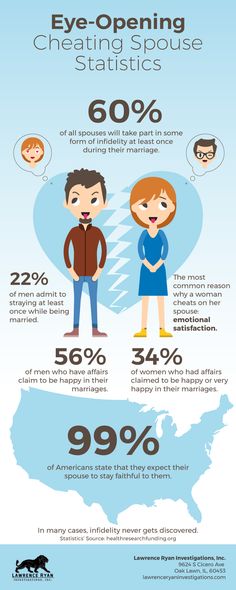 What to do with this crisis: turn away from your partner and try to find a "new happiness" on the side, gain this joy and integrity with another, or still try to get through to each other - to a real, uninvented, living and unique person - and, in a happy case, grow together in a relationship? This is the point of choice for each pair.”
What to do with this crisis: turn away from your partner and try to find a "new happiness" on the side, gain this joy and integrity with another, or still try to get through to each other - to a real, uninvented, living and unique person - and, in a happy case, grow together in a relationship? This is the point of choice for each pair.”
Experts told why women cheat and how to prevent it
MOSCOW, March 7 — RIA Novosti. The behavior of a woman's parents and girlfriends, as well as her reaction to films in which the wife is unfaithful to her husband, can betray a predisposition to looking for relationships on the side, psychologists and sexologists say. On the eve of International Women's Day, experts told RIA Novosti how to prevent the betrayal of a beloved woman and whether it is possible to restore relations if she nevertheless embarked on a "crooked path".
Thirst for change
According to the family psychologist, Candidate of Psychological Sciences Irina Obukhova, the word "betrayal" already implies a desire to change something in life, if something does not suit a person.
"He wants to change something in his life, but he is afraid to do it. So he tries to get in touch at the level of flirting on social networks, views at work, and so on," she said.
According to the doctor-sexologist, psychotherapist, president of the professional association of sexologists Yevgeny Kulgavchuk, each person understands in his own way what treason is.
"Indeed, for some man, the correspondence of his wife with a classmate will be a betrayal. The woman herself may also think so, and the other may not think at all that she is cheating in this way," the doctor noted.
He recalled that some women like to repeat the saying "the husband ate too many pears."
"This shows the emotional insignificance of this husband, and psychologically the woman considers herself free for love. Often this happens in formal marriages," said the sexologist.
Crooked path
According to Obukhova, the motives of male and female cheating are somewhat similar. First of all, it is boredom, a feeling of dissatisfaction, resentment and compensation for betrayal on the principle of "I will answer you the same."
First of all, it is boredom, a feeling of dissatisfaction, resentment and compensation for betrayal on the principle of "I will answer you the same."
"But for a woman there should be a solid reason for cheating when something fundamentally doesn't suit her in a companion. However, if a man cheats, he doesn't do it because he wants to change something, he often needs passions. And a woman subconsciously looking for changes, she wants warmth and affection, which is not enough," she explained.
Kulgavchuk added that, as a rule, women are driven to cheat by a feeling of underestimation, emotional emptiness, as well as a desire for a fleeting passion and adventure.
"Many other reasons can be added: from a desire for revenge to condescension out of pity. There are fewer motives for male infidelity. As a rule, this is a search for new sensations and a search for recognition," he said.
To find out if the woman you love has a predisposition to cheating, you first need to look at her parents, the expert believes.
"Then look at your girlfriends, because whoever you mess with is what you'll get," added Kulgavchuk.
The doctor also advises to watch films with similar scenarios together, then pay attention to the emotions and statements of the beloved woman when discussing the film.
"Often, men at the reception ask me a question, how to guarantee the absence of female infidelity? I answer that everything is simple here: you need to love a woman and make her fall in love with you, feeling and surprising her, it is important to take care of her. You also need to respect her, be able to talk heart to heart with her, pamper and protect. Truly in love women who know how to love, as a rule, do not cheat, "he concluded.
Punctures of a traitor
According to Kulgavchuk, there are no clear signs that you are being cheated on. However, several worrisome points can be identified.
"As a rule, this is an emotional distance, the emergence of new interests, habits, tastes, a sudden attention to one's own appearance. Also, the appearance of new closed "islands of time", irritability and anxiety when a partner tries to pick up the phone or look at the contents of the mail. Transparency changes to defending the rights to personal time," he explained.
Also, the appearance of new closed "islands of time", irritability and anxiety when a partner tries to pick up the phone or look at the contents of the mail. Transparency changes to defending the rights to personal time," he explained.
Obukhova also believes that absent-mindedness towards a man, inattention to his problems, can also indicate that a woman has relationships on the side.
"For example, she often asks how things are at work, but does not listen to the answer. Also, at first in the house, she becomes more playful, she sort of shifts her attitude from the man she likes to her husband. But soon this disappears ", the psychologist explained.
Understand and forgive?
According to Kulgavchuk, the ability to forgive betrayal depends on the age, experience, wisdom of a particular person.
"If it's appreciated, it's worth forgiving. Otherwise, you just might not find a mate. Anything can happen in life. It's important to be able to draw conclusions. And in a crisis period, don't continue to blame, but try to understand," he said.
And in a crisis period, don't continue to blame, but try to understand," he said.
The doctor also emphasized that it is definitely not worth telling the details of infidelity to your spouses. After such revelations, many people cannot sleep peacefully, torturing themselves.
"You need to understand the causes of adultery not in the kitchen in nightly vigils with alcohol, which sometimes end in beatings or murders, but in the office of a sexologist," he noted.
According to Obukhova, casual relationships on the side that do not continue can both positively and negatively affect the future of a family, a couple.
"If a relationship is in the air in a couple, then betrayal will only push for parting. You can consider going to the side as an element of novelty, which supposedly strengthens the marriage. But I am against this, because any betrayal is based on the phrase "we have no irreplaceable" "This is a depreciation of a partner. But if the relationship is strong enough, then betrayal can be accepted and forgiven," she believes.

